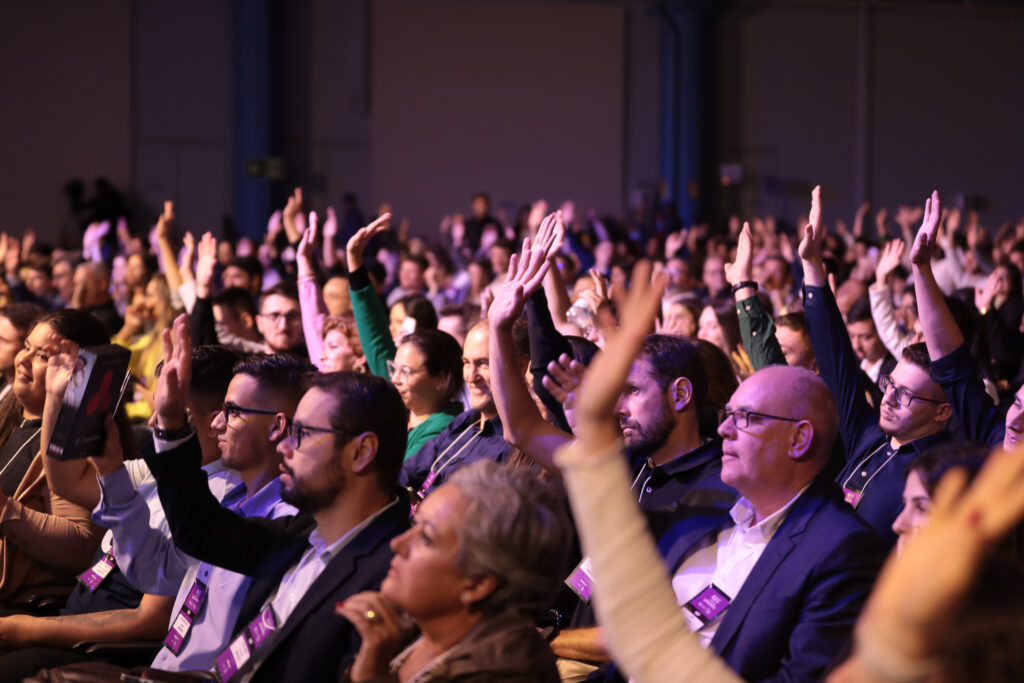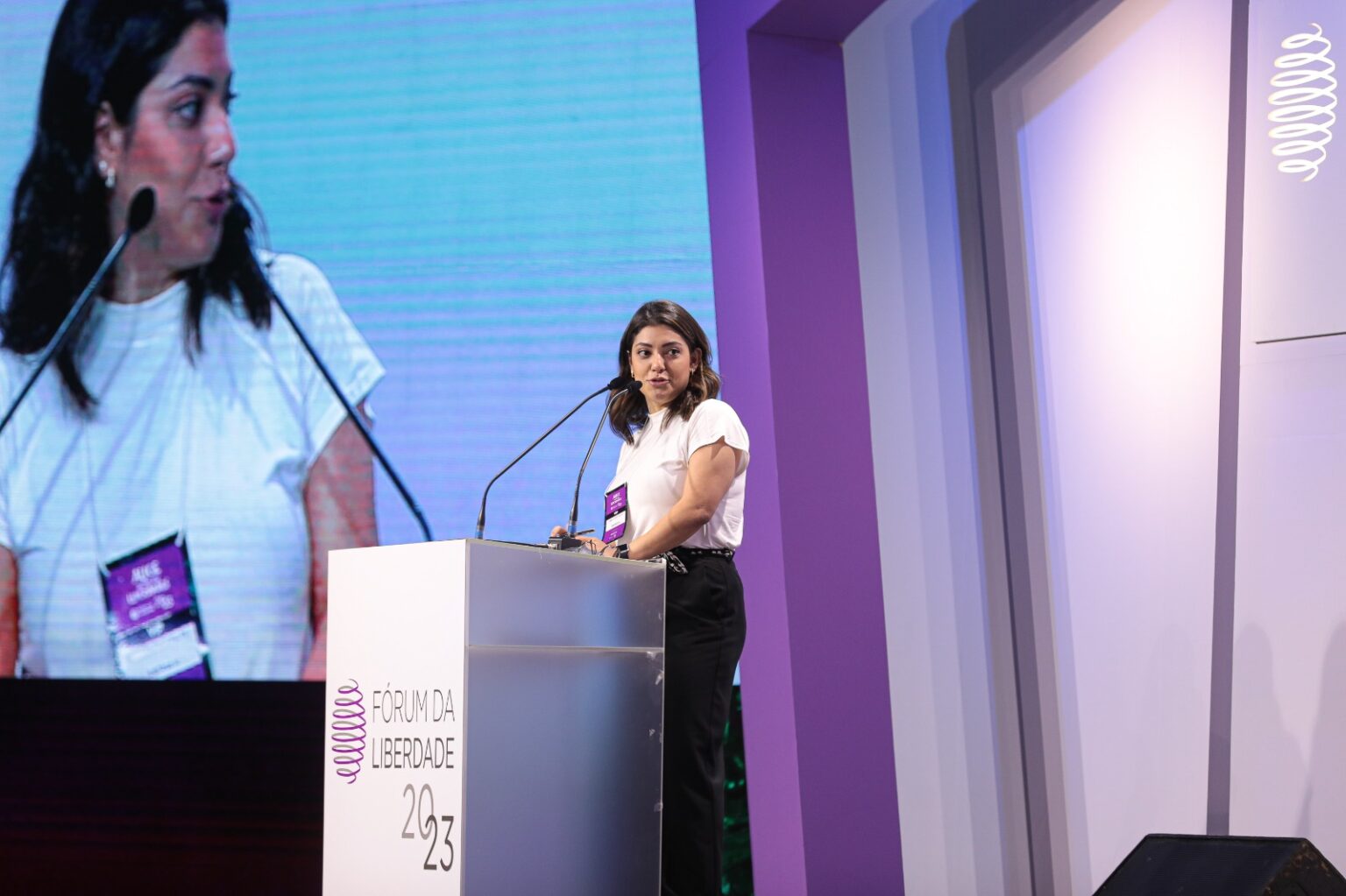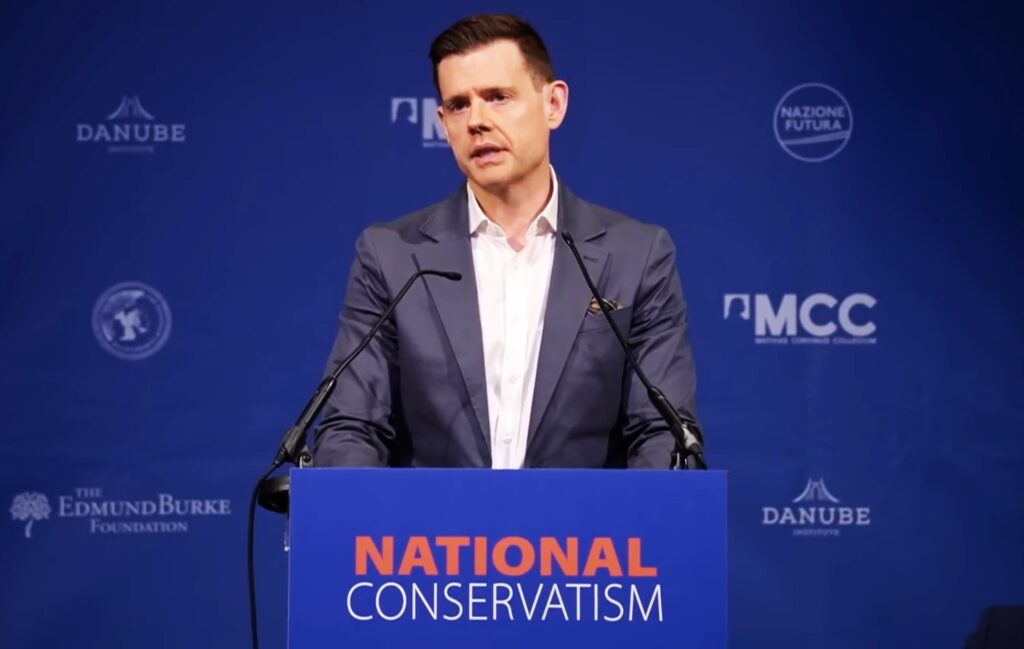“I even took off my farm boots and wore high heels to come here today,” Camila Telles told the audience of political activists, business executives, and students at April’s Liberty Forum, an annual conservative gathering in Brazil sponsored by the Atlas Network.
Telles is an agribusiness influencer – her clients include the major Brazilian meat producers Seara and Friboi – with more than 300,000 followers on Instagram and a talent for taking her pro-big farmer messages viral. From the dimly-lit stage, she opened the event’s first-ever panel on agribusiness with familiar talking points, mocking leftists for blaming climate change on cows.
Then Telles turned to the specter that haunts Brazil’s agribusiness sector: “land invasion,” or the fear that the leftwing Lula administration might actually fulfill its campaign promises to transfer farmland from private sector to worker ownership.
“We, producers, live with this fear daily,” Telles said. “Unfortunately, the lack of safety has now got worse, which leaves us very worried.” Following the template made famous by TED Talks, Telles spoke with a slow, steady intensity, earning the audience’s applause as she delivered punch lines and made dramatic pauses.
Brazil’s knife-edge presidential election last October split the country’s powerful rightwing coalition. Some camps supported the reelection of populist strongman Jair Bolsonaro. Others put their traditional political priorities on hold to back leftwinger Luiz Inácio Lula da Silva’s campaign – ultimately successful – to return to the presidency, arguing that Bolsonaro’s authoritarianism was putting Brazilian democracy at risk.
“There is a great concern for the quality of democracy in Latin America” among some conservatives, says Mano Ferreira, the director of Livres, a free-market think tank affiliated with the Atlas Network.
Over its 35-year history, the Liberty Forum has become one of the year’s main meeting points for rightwing think tanks and politicians from across Latin America. This year, the forum served as a stop along the road to rebuilding Brazil’s conservative political alliance. The panel featuring prominent agribusiness advocates suggested that Brazil’s big farmers are also looking for allies to block the Lula administration and regain the influence they enjoyed under Bolsonaro, whose moves to open up the Amazon led to a surge in deforestation driven by ranching and mining.
Telles was joined on the stage by Joaquim Alvaro Pereira Leite, who served as an environment minister under Bolsonaro, and Antônio Cabrera, a former agriculture minister, known as a critic of laws protecting Indigenous territories from conversion into livestock ranches. Cabrera is among the prominent Brazilian members of the Mont Pelerin Society , a network of neoliberals affiliated with more than 100 conservative organizations – many of which are part of the Atlas Network.
While the talk at Liberty Forum focused on the issues preoccupying Brazilian conservatives, the conference is only one node in a large, decentralized network whose members play a key role in propagating climate science denial, and opposing environmental regulation, worldwide.
The Liberty Forum is staged by the Institute of Business Studies, a libertarian think tank known by its Portuguese-language acronym IEE (for Instituto de Estudos Empresariais). The group has, in turn, been supported by the Atlas Network, a powerful Washington, D.C.-based think tank that has spent decades nurturing and financing conservative think tanks globally, and which was among the Liberty Forum’s sponsors.

With a mission “to litter the world with free-market think-tanks,” in the words of former Atlas Network president John Blundell – also a former president of the Charles G. Koch Foundation – Atlas now says it has more than 500 partners in nearly 100 countries. In Brazil, Atlas Network member groups have played an outsized role in advocating for – and sometimes implementing – the kind of rollbacks of environmental regulations that have helped push the Amazon to the brink.
Web of Influence
Based in the southeastern city of Porto Alegre, where the Liberty Forum took place, the IEE describes its mission as providing leadership training for fellow conservatives.
In practice, the organization operates much like a club of very wealthy people with a lot of economic and political influence. According to IEE itself, its members and investors account for about five percent of Brazil’s gross domestic product, which was $1.92 trillion in 2022.
According to Luan Brun, a doctoral candidate in political science at the Federal University of Santa Catarina who studies IEE and the Atlas Network in Brazil, the Liberty Forum is one of the IEE’s main platforms for boosting right-wing political candidates.
“For a forum that claims to be pluralistic, it turns out not to be in practice, since there are almost no progressive politicians taking part,” says Brun.
IEE also participates directly in Brazilian politics, Brun says. IEE founder Winston Ling introduced Jair Bolsonaro to Paulo Guedes, who went on to head Bolsonaro’s Ministry of the Economy. Other IEE members Paulo Uebel and Wagner Lenhart were part of the Bolsonaro government’s economic team.
The IEE has long-standing ties to the Atlas Network, which is largely funded by the oil industry and conservative philanthropic organizations from the United States, according to previous DeSmog investigations.
Ricardo Gomes, a former IEE president who was elected Deputy Mayor of Porto Allegre in 2020, is a member of the Atlas Network’s Global Council of CEOs.
In the United States, Atlas, which pivoted from early support for the tobacco lobby to climate science denial, works with prominent conservative think tanks such as the New York-based Manhattan Institute, the National Center for Policy Analysis in Texas, and the Acton Institute in Michigan.
As of August 2021, the Atlas website listed 15 Brazil-based think tanks that focus on academia, politics, and other fields as partners. (The list was subsequently removed from the site.) Prominent among them: Instituto Millenium, which provided key staff for the Bolsonaro government, and helped his administration to legitimize his disastrous economic and environmental policies; and Students for Liberty Brazil, which helped mobilize protests calling for former leftwing president Dilma Rousseff’s impeachment in 2016.
An Atlas Network project called the Center for Latin America focuses on observing and fostering pro-free market initiatives in the region. While the Atlas Network does not make per-country financial data available, annual U.S. tax filings show that between 2010 and 2021, the group gave approximately $12 million to Latin American think tanks, reported mostly as funding for “economic education.”
Atlas Network is a loyal sponsor of the Liberty Forum. Atlas executives and coordinators have frequently appeared at the conference – in 2023, CEO Brad Lips, Associate Director Antonella Marty, and former president Alejandro Chafuen took the stage. Lips and Chafuen are also members of the Mont Pelerin Society.
IEE has been a finalist for the Atlas Network “Templeton Freedom Award” several times, and won the award In 2007. In 2017, Atlas awarded IEE its “Juan Carlos Cachanosky Award for Dissemination of Free Society Principles.”
The Atlas Network did not respond to DeSmog’s request for comment.
Divisions on the Right
During the 2022 election, some conservative and and libertarian groups supported Bolsonaro, while others took a wait-and-see approach in the first round then backed Lula’s Workers’ Party in the run-off. Livres, which tried to keep a safe distance from its further-right peers during the election, has since turned to noisy opposition of Lula, who has pledged to end the Amazon deforestation that surged under his agribusiness-friendly predecessor. Livres, an Atlas Network affiliate, was also a finalist for the Templeton Freedom Award in 2022.
“There is a faction concerned about the damage done by cooperating with populist projects,” says Ferreira, the director of Livres.
While the most radical remnants of the Bolsonaro coalition perceive Lula as the biggest threat to Brazil’s democracy, some observers think they’ve moved to the political fringes.
“I think [that] faction is cut off from contemporary issues,” says the director of a conservative think tank who asked not to be identified.
At this year’s Liberty Forum, this director noted that the vast majority of the panels dealt with what he considered to be topics marginal to the current political struggle to maintain Brazil’s democracy, such as a panel on liberal feminism led by Atlas’ Antonella Marty.
| ORGANIZATION | LOCATION |
| Centro Mackenzie de Liberdade Econômica (Mackenzie Center for Liberal Economics) | São Paulo |
| Instituto Atlantos (Atlantos Institute) | Porto Alegre |
| Instituto de Estudos Empresariais (Institute for Entrepreneurial Studies) | Porto Alegre |
| Instituto de Formação de Líderes (Institute for Leadership Training) | Belo Horizonte |
| Instituto de Formação de Líderes de SP (Institute for Leadership Training SP) | São Paulo |
| Instituto de Formação de Líderes de SC (Institute for Leadership Training SC) | Santa Catarina |
| Instituto Liberal (Liberal Institute) | Rio de Janeiro |
| Instituto Liberal de São Paulo (Liberal Institute of São Paulo) | São Paulo |
| Instituto Liberdade (Freedom Institute) | Porto Alegre |
| Instituto Ludwig Von Mises Brasil (Ludwig Von Mises Institute of Brazil) | São Paulo |
| Instituto Líderes do Amanh (Leaders of Tomorrow Institute) | Vitória |
| Instituto MIllenium (Millennium Institute) | Rio de Janeiro |
| Livres (Free) | Rio de Janeiro |
| Students for Liberty Brasil | São Paulo |
These divisions within the right wing have not prevented the formation of an anti-Lula front, however, because they are still united by their common neoliberal agenda of smaller government and slashed budgets, according to analysts.
“In the Lula government we have a bigger state and an allowance for the state to spend more money in an uncontrolled way,” says Vladimir Maciel, the academic director of the Mackenzie Center for Economic Freedom, a think tank that focuses on producing free-market policy advocacy studies.
Rodrigo Saraiva Marinho, an influential right-wing figure who currently heads the Free Market Institute, echoed this analysis. “We want to prevent the growth of the state. Therefore, our position is to work against the policies of the Workers’ Party.”
Conservative think tanks, including those affiliated with Atlas Network, are approaching the post-Bolsonaro era in different ways – ranging from vocal opposition to Lula, to a longer-term strategy to defend right wing ideals. “You have those who are going to be in politics and those who are going to be out of it, because that is not their mission,” argues Marinho, who sees his Free Market Institute’s work as an ongoing battle to maintain the right’s legitimacy in national political conversations despite the left’s return to power. “[We are] setting the tone for ideas, and not discussing Lula’s government,” he says.
A Brand-New Old Alliance
While the agribusiness sector has its own institutes and political networks, Lula’s election has underscored the value of building bridges with the right – whose long-standing opposition to government subsidies can grate with big farmers.
Telles, the influencer, is herself a product of the power and influence wielded by Brazilian agribusiness, which has supported her rise to prominence in line with its more traditional methods of exercising power via supporters in the National Congress, and throughout “deep Brazil” via friendly mayors, governors, deputies, and farmers.
In Marinho’s opinion, the presence of agribusiness at the Liberty Forum was a clear sign that the industry is worried about Lula’s agenda.
“The fact that the agribusiness panel is being held at Liberty Forum shows that the sector has no dialogue with Lula’s government,” says Vladimir Maciel, academic director at the Mackenzie Center for Economic Freedom.
Maciel noted that current Minister of Agriculture Carlos Fávaro did not attend April’s Agrishow, the major Latin American agribusiness fair.
By comparison Bolsonaro not only participated in the annual event while president, Maciel says, but came back this year – to applause – despite being out of office.
Under Lula, “there is an alignment” of interests between agribusiness and right-wing think tanks, Maciel says, although as yet “you do not find a think tank producing agribusiness-specific content.” The link does not go as far as an explicit collaboration, he says.
Many IEE members have existing bonds with agribusiness. Although Telles presented herself as an outsider at the Liberty Forum, she was described as a “long-time Forum attendee.” Bolsonaro’s former environment minister, Ricardo Salles, has also made repeat appearances at IEE panels and conferences. Salles gained notoriety for wanting to “run the cattle herd” through the Amazon, and has worked with the Instituto Millenium through his right-wing movement, Movimento Endireita Brasil.
The agribusiness sector has always worked closely with right-wing think tanks, says Camila Feix Vidal, a professor of international relations at Federal University of Santa Catarina.
She pointed out that both defend a free market model of exporting primary goods and reject the state’s power to regulate the industry’s environmental impacts. “It is not by chance that [neo]liberal institutes tend to question or delegitimize the concept of global warming,” she noted.
Camila Rocha, a researcher at the Brazilian Center for Analysis and Planning (Cebrap),says that the alliance between right-wing think tanks and agribusiness “intensified” during Lula’s first presidency thanks to shared libertarian beliefs, including the criminalization of agrarian reform.
IEE member Matheus Almeida, director of the 2023 Liberty Forum, says the idea to hold an agribusiness panel was not directly related to Lula’s election. However, in his view IEE and farmers share the same values, even if farmers do not always realize it.
Almeida sees a need to unite rural and urban areas into an “agribusiness public” and dispel supposed myths about the sector. “All the speakers on the agribusiness panel talked about this. A stereotype of the rural man is gradually being created which is not true,” he says.
Despite some differences and internal divisions, a growing confluence of shared interests between agribusiness and right-wing think tanks since Lula’s election victory has formed a powerful new political current to oppose his agenda, and any bid for re-election. At the end of the day, Telles wears high heels more often than she would like to admit.
Subscribe to our newsletter
Stay up to date with DeSmog news and alerts






